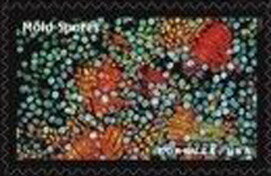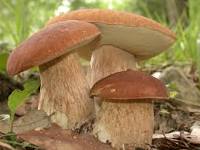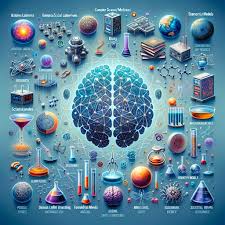Stamp: Mold Spores (United States of America 2023)
Mold Spores (United States of America 2023)
10 August (United States of America ) within release Life Magnified (2023) goes into circulation Stamp Mold Spores face value FOREVER No Face Value
| Stamp Mold Spores in catalogues | |
|---|---|
| Colnect codes: | Col: US 2023.08.10-01q |
Stamp is horizontal format.
Stamp from mini-sheet. Face value US$0.66 on day of issueAlso in the issue Life Magnified (2023):
- Stamp - Acorn Barnacle face value FOREVER;
- Stamp - Arranged Diatoms face value FOREVER;
- Stamp - Barnacle Legs face value FOREVER;
- Stamp - Blue Button Organism face value FOREVER;
- Stamp - Diving Beetle Front Foot face value FOREVER;
- Stamp - Flame Lily Pollen face value FOREVER;
- Stamp - Freshwater Protozoans face value FOREVER;
- Stamp - Freshwater Snail Tongue face value FOREVER;
- Stamp - Human Hair face value FOREVER;
- Mini Sheet - Life Magnified face value 20*FOREVER;
- Stamp - Macaw Parrot Feathers face value FOREVER;
- Stamp - Mold Spores face value FOREVER;
- Stamp - Moss Leaves face value FOREVER;
- Stamp - Moth Antenna face value FOREVER;
- Stamp - Moth Wing Scales face value FOREVER;
- Stamp - Mouse Brain Neurons face value FOREVER;
- Stamp - Mushroom Gills face value FOREVER;
- Stamp - Oak Leaf Surface face value FOREVER;
- Stamp - Red Blood Cells face value FOREVER;
- Stamp - Starling Bone Tissue face value FOREVER;
- Stamp - Zebrafish face value FOREVER;
- Full Pane - Life Magnified Imperf face value None;
Stamp Mold Spores it reflects the thematic directions:
A mushroom (or toadstool) is the fleshy, spore-bearing fruiting body of a fungus, typically produced above ground on soil or on its food source. The standard for the name "mushroom" is the cultivated white button mushroom, Agaricus bisporus; hence the word "mushroom" is most often applied to those fungi (Basidiomycota, Agaricomycetes) that have a stem (stipe), a cap (pileus), and gills (lamellae, sing. lamella) on the underside of the cap. These gills produce microscopic spores that help the fungus spread across the ground or its occupant surface. "Mushroom" describes a variety of gilled fungi, with or without stems, and the term is used even more generally, to describe both the fleshy fruiting bodies of some Ascomycota and the woody or leathery fruiting bodies of some Basidiomycota, depending upon the context of the word. Forms deviating from the standard morphology usually have more specific names, such as "bolete", "puffball", "stinkhorn", and "morel", and gilled mushrooms themselves are often called "agarics" in reference to their similarity to Agaricus or their order Agaricales. By extension, the term "mushroom" can also designate the entire fungus when in culture; the thallus (called a mycelium) of species forming the fruiting bodies called mushrooms; or the species itself.
Science is a systematic discipline that builds and organises knowledge in the form of testable hypotheses and predictions about the universe.Modern science is typically divided into two or three major branches: the natural sciences (e.g., physics, chemistry, and biology), which study the physical world; and the behavioural sciences (e.g., economics, psychology, and sociology), which study individuals and societies.The formal sciences (e.g., logic, mathematics, and theoretical computer science), which study formal systems governed by axioms and rules, are sometimes described as being sciences as well; however, they are often regarded as a separate field because they rely on deductive reasoning instead of the scientific method or empirical evidence as their main methodology. Applied sciences are disciplines that use scientific knowledge for practical purposes, such as engineering and medicine


